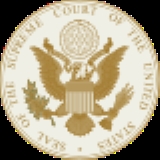|
1789
|
|
|
1790
|
|
2.1.1790
In New York City, the Supreme Court of the United States attempts to convene for the first time. |
|
2.2.1790
The Supreme Court of the United States convenes for the first time.
|
|
|
1803
|
|
2.24.1803
In ''Marbury v. Madison'', the Supreme Court of the United States establishes the principle of judicial review.
|
|
|
1804
|
|
11.30.1804
The Democratic-Republican-controlled United States Senate begins an impeachment trial against Federalist-partisan Supreme Court of the United States Justice Samuel Chase. |
|
|
1841
|
|
3.9.1841
The U.S. Supreme Court rules that captive Africans who had seized control of the ship carrying them had been taken into slavery illegally. |
|
|
1857
|
|
3.6.1857
Supreme Court of the United States rules in the Dred Scott v. Sandford case.
|
|
|
1879
|
|
|
1893
|
|
5.10.1893
The Supreme Court of the United States rules in ''Nix v. Hedden'' that a tomato is a vegetable, not a fruit, under the Tariff Act of 1883.
|
|
|
1895
|
|
4.8.1895
In Pollock v. Farmers' Loan & Trust Co. the Supreme Court of the United States declares unapportioned income tax to be unconstitutional. |
|
|
1905
|
|
4.17.1905
The Supreme Court of the United States decides ''Lochner v. New York'' which holds that the "right to free contract" is implicit in the due process clause of the Fourteenth Amendment of the United States Constitution. |
|
|
1911
|
|
5.15.1911
The United States Supreme Court declares Standard Oil to be an "unreasonable" monopoly under the Sherman Antitrust Act and orders the company to be broken up. |
|
|
1915
|
|
6.21.1915
The U.S. Supreme Court hands down its decision in ''Guinn v. United States'' 238 US 347 1915, striking down an Oklahoma law denying the right to vote to some citizens. |
|
|
1916
|
|
1.24.1916
In Brushaber v. Union Pacific Railroad, the Supreme Court of the United States declares the federal income tax constitutional. |
|
|
1921
|
|
|
1922
|
|
|
1935
|
|
5.27.1935
New Deal: The Supreme Court of the United States declares the National Industrial Recovery Act to be unconstitutional in A.L.A. Schechter Poultry Corp. v. United States, (295 U.S. 495).
|
|
|
1936
|
|
1.6.1936
The Supreme Court of the United States rules that the 1933 Agricultural Adjustment Act is unconstitutional in the case United States v. Butler et al.
|
|
|
1937
|
|
2.5.1937
President Franklin D. Roosevelt proposes a plan to enlarge the Supreme Court of the United States.
|
|
7.22.1937
New Deal: the United States Senate votes down President Franklin D. Roosevelt's proposal to add more justices to the Supreme Court of the United States.
|
|
|
1939
|
|
2.27.1939
United States labor law: The U.S. Supreme Court rules that sit-down strikes violate property owners' rights and are therefore illegal. |
|
|
1953
|
|
|
1957
|
|
|
1964
|
|
2.17.1964
In ''Wesberry v. Sanders'' the Supreme Court of the United States rules that congressional districts have to be approximately equal in population.
|
|
|
1965
|
|
6.7.1965
The Supreme Court of the United States hands down its decision in Griswold v. Connecticut, effectively legalizing the use of contraception by married couples.
|
|
|
1967
|
|
|
1969
|
|
|
1970
|
|
11.9.1970
Vietnam War: The Supreme Court of the United States votes 6 to 3 against hearing a case to allow Massachusetts to enforce its law granting residents the right to refuse military service in an undeclared war.
|
|
|
1973
|
|
1.22.1973
The Supreme Court of the United States delivers its decision in Roe v. Wade, legalizing elective abortion in all fifty states. |
|
|
1974
|
|
|
1975
|
|
|
1978
|
|
3.28.1978
The US Supreme Court hands down 5-3 decision in ''Stump v. Sparkman'', 435 U.S. 349, a controversial case involving involuntary sterilization and judicial immunity. |
|
6.28.1978
The United States Supreme Court, in ''Regents of the University of California v. Bakke'' bars quota systems in college admissions. |
|
|
1981
|
|
9.15.1981
The Senate Judiciary Committee unanimously approves Sandra Day O'Connor to become the first female justice of the Supreme Court of the United States |
|
9.25.1981
Sandra Day O'Connor becomes the 102nd person sworn in as an Associate Justice of the Supreme Court of the United States and the first woman to hold the office.
|
|
|
1986
|
|
6.30.1986
The U.S. Supreme Court rules in Bowers v. Hardwick that states can outlaw homosexual acts between consenting adults. |
|
|
1989
|
|


